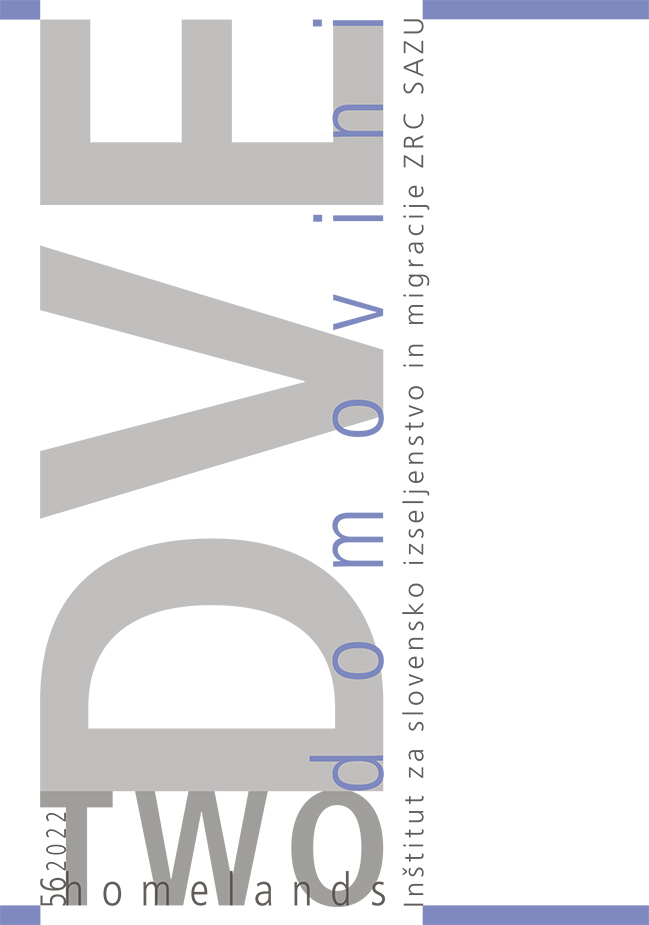Immigrants and the Pandemic in a Leading Region of Northern Italy: A Question of Positioning
DOI:
https://doi.org/10.3986/dd.2022.2.05Keywords:
pandemic, Italy, immigrants, social capital, inequalitiesAbstract
This paper examines the impact of the pandemic on immigrants in one of the most economically developed areas in Northern Italy. Using a qualitative approach, the author highlights the effects on the traditional dimensions of inclusion (work and housing) and the perspectives of the younger generations (education and transition to adulthood). The results indicate how the weak social positioning of immigrants strongly and selectively conditioned their response to the pandemic. The study also revealed the intense erosion of immigrants’ social capital and the need for strategies to strengthen it.
Downloads
References
Anastasia, Bruno, Oliva, Silvia (2015). Il lavoro rarefatto. Nord Est 2015. Rapporto sulla società e l’economia (eds. Stefano Micelli, Silvia Oliva). Venice: Marsilio, 66–86.
Barbieri, Paolo, Scherer, Stefani (2005). Le conseguenze sociali della flessibilizzazione del mercato del lavoro in Italia. Stato e Mercato 74, 291–321. https://doi.org/10.1425/20484.
Barbieri, Paolo, Cutuli, Giorgio, Scherer, Stefani (2018). In-work poverty in un mercato del lavoro duale: individualizzazione riflessiva dei rischi sociali o stratificazione della disuguaglianza sociale? Stato e Mercato 114, 419–460. https://doi.org/10.1425/91627.
Becattini, Giacomo (2000). Il Distretto Industriale. Un nuovo modo di interpretare il cambiamento economico. Turin: Rosenberg & Sellier.
Berger, Peter Ludwig (2014). The Many Altars of Modernity. Toward a Paradigm of Religion in a Pluralist Age. Boston: De Gruyter.
Besozzi, Elena, Colombo, Maddalena, Santagati, Mariagrazia (2009). Giovani stranieri, nuovi cittadini. Le strategie di una generazione ponte. Milan: FrancoAngeli.
Della Puppa, Francesco, Perocco, Fabio (2021). The Coronavirus Crisis and Migration: Inequalities, Discrimination, Resistance, Dve Domovini / Two Homelands 54, 7–12. https://doi.org/10.3986/dd.2021.2.01.
Donà, Giorgia (2021). Race, immigration and health: the Hostile Environment and public health responses to Covid-19. Ethnic and Racial Studies 44/5, 906–918. https://doi.org/10.1080/01419870.2021.1881578.
Girardi, Davide (2021). I risvolti della pandemia tra la popolazione di origine straniera. Analisi e ricerche, June 2021, https://www.venetoimmigrazione.it/fr/oss-immigrazione-analisi-e-ricerche (16. 12. 2021).
GPMB – Global Preparedness Monitoring Board (2019). A World at Risk, https://apps.who.int/gpmb/assets/annual_report/GPMB_annualreport_2019.pdf (16. 12. 2021).
ISTAT (2021). Rapporto annuale 2021. La situazione del Paese, www.istat.it/it/archivio/259060 (15. 12. 2021).
Kenner, Steve, Lange, Dirk (2019). Digital Citizenship Education. Challenge and Opportunity. Scuola democratica 4, 47–55. https://doi.org/10.12828/96361.
Marini, Daniele, ed. (2005). Fuori dalla media. Percorsi di sviluppo delle imprese di successo. Venice: Marsilio.
Marini, Daniele (2012). Innovatori di confine. I percorsi del nuovo Nord Est. Venice: Marsilio.
OECD (2020). What is the impact of the COVID-19 pandemic on immigrants and their children?, https://www.oecd.org/coronavirus/policy-responses/what-is-the-impact-of-the-covid-19-pandemic-on-immigrants-and-their-children-e7cbb7de (15. 12. 2021).
Perocco, Fabio (2021). The Coronavirus Crisis and Migration: The Pan-Syndemic and Its Impact on Migrants, Dve Domovini / Two Homelands, 54, 13–28. https://doi.org/10.3986/dd.2021.2.02.
Vergolini, Loris, Vlach, Eleonora (2020). Perché la scuola online non crei disuguaglianze, https://www.lavoce.info/archives/65801/perche-la-scuola-online-non-crei-disuguaglianze (10. 12. 2021).
World Health Organization (2021). Coronavirus disease (COVID-19) pandemic, https://www.who.int/emergencies/diseases/novel-coronavirus-2019 (10. 12. 2021).
Published
How to Cite
Issue
Section
License

This work is licensed under a Creative Commons Attribution-NonCommercial-NoDerivatives 4.0 International License.
Authors guarantee that the work is their own original creation and does not infringe any statutory or common-law copyright or any proprietary right of any third party. In case of claims by third parties, authors commit their self to defend the interests of the publisher, and shall cover any potential costs.
More in: Submission chapter





